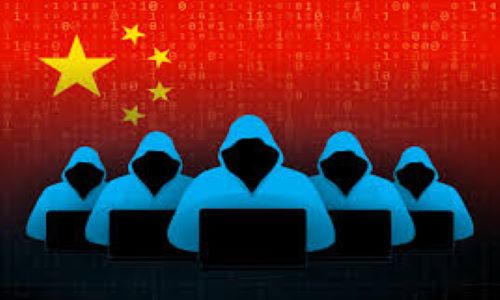In the wake of House subcommittee hearings this week on threats coming from the Chinese Communist Party (CCP), the FBI and lawmakers are warning of the cybersecurity threat that the CCP poses to U.S. infrastructure.
Over the last year, the size and scope of the CCP's cyberwarfare tactics have begun to come to light, which U.S. officials have publicly admitted to being stunned by. On Tuesday, FBI Director Christopher Wray repeated his warnings from January (when he stated that China's hackers are "wreaking havoc" on American infrastructure), remarking that the CCP is "the defining threat of our generation."
He continued, "China's hacking program is larger than that of every other major nation, combined. If each one of the FBI's cyber agents and intelligence analysts focused exclusively on the China threat, China's hackers would still outnumber FBI cyber personnel by at least 50 to 1."
He warned that China already has "burrowed" into critical infrastructure in the United States and now is just waiting for "the right moment to deal a devastating blow."
The ongoing hacking campaign, known already as Volt Typhoon, has gained access to American telecommunications, energy, water and other companies, including pipeline operators.
Wray charged China is assembling the "ability to physically wreak havoc on our critical infrastructure at a time of its choosing. ... Its plan is to land low blows against civilian infrastructure to try to induce panic."
The report explained, "Wray said it was difficult to determine the intent of this cyber pre-positioning which was aligned with China's broader intent to deter the U.S. from defending Taiwan."
In February, it was the Epoch Times that reported on CISA documentation that the Communist regime is installing "malware" in key U.S. systems in preparation for the chance that there would be a major conflict.
"A Feb. 7 advisory released by the Cybersecurity and Infrastructure Security Agency (CISA) seeks 'to warn critical infrastructure organizations' about China's attempts to infiltrate, disrupt, and destroy vital U.S. facilities," explained a report in the Epoch Times.
CISA warned, "Chinese state-sponsored cyber actors are seeking to pre-position themselves on IT networks for disruptive or destructive cyberattacks against U.S. critical infrastructure in the event of a major crisis or conflict with the United States."
That threatening computer code would be intended "to launch destructive cyber-attacks that would jeopardize the physical safety of Americans and impede military readiness," the agency warning said.
Examples of the CCP's cyberwarfare campaign on the U.S. abound.
A recent report from The Heritage Foundation catalogues how CCP have hackers infiltrated "key sectors including communications, energy and water," and "may have the ability to access heating and air conditioning systems to overheat data servers, to cause blackouts by disrupting control rooms that regulate water and electricity, and to manipulate surveillance cameras at some of these facilities."
In February, a report revealed that Chinese hackers had embedded themselves inside U.S. infrastructure IT environments for five years without being detected in order to extract sensitive information.
In addition, the military is among the prime targets of the CCP's cyberwarfare campaign. In 2013, it was discovered that a China-backed military hacking group known as APT1 "had pilfered military contractor designs such as the Patriot, THAAD and Aegis missile systems, as well as aircraft designs including the F/A-18 Super Hornet, V-22 Osprey, Black Hawk helicopter and F-35 joint strike fighter."
Government email servers have also been exploited by CCP hackers, with the Biden administration hammering Microsoft for its lax cybersecurity policies.
On Thursday's edition of "Washington Watch with Tony Perkins," Rep. Rich McCormick (R-Ga.) contended that increased openness about the threat of CCP hackers is needed in order to keep the U.S. government accountable.
"We can't always talk about cyber threats because a lot of the stuff is classified -- that's the problem. The American public really needs to be informed on a lot of this stuff so they can put pressures in the right areas. Unfortunately, a lot of stuff is not declassified sometimes on purpose, sometimes because we just get used to containing this information."
McCormick, a former emergency room doctor who serves on the House Foreign Affairs Committee as well as the House Armed Services Committee, went on to highlight a recent cyberattack on the health care industry.
"But quite frankly, we don't have to worry just about cybersecurity and having our information stolen. We recently had a bunch of hospitals shut down [as well as] their billing process -- just that alone could be destructive [by] stealing a patient's information and how we reimburse medicine and hospitals and doctors. It sounds like a trivial thing, but when that happens for a couple of weeks, you're talking about billions of dollars of impact, one out of every three patients."
The congressman further pointed out the immense scope of the cybersecurity threat posed by the CCP.
"We're being constantly attacked, relentlessly attacked. It's disruptive to our entire society -- it can happen on power grids, it can happen to your information, it can happen to businesses. This is something that we have to be more and more aware of because as AI [artificial intelligence] comes into its full fruition, it starts to affect us. It can literally be like this scenario out of movies where you see stoplights changing the wrong color at the wrong time [and] could cause catastrophes, shut down your power to a hospital. It could do all kinds of horrible things that would impact our economy and our society in major ways."
Family Research Council President Tony Perkins responded by emphasizing the importance of a competent government. "This puts a lot of responsibility on the government, because if there's one thing the government has a responsibility to do ... it is to protect us."
 By Dan Hart/Washington Stand April 19, 2024
By Dan Hart/Washington Stand April 19, 2024
 By Dan Hart/Washington Stand April 19, 2024
By Dan Hart/Washington Stand April 19, 2024